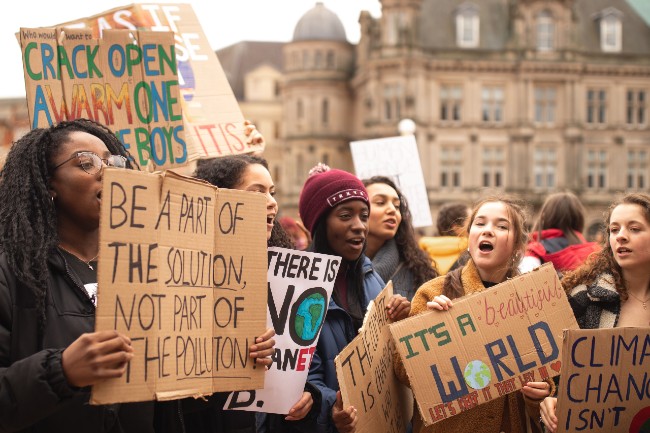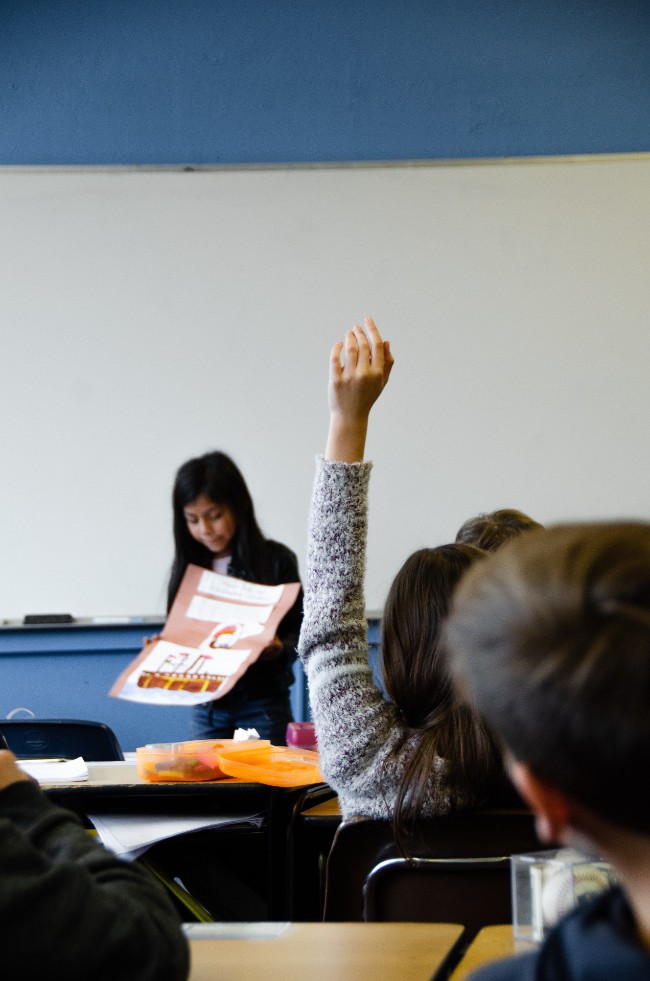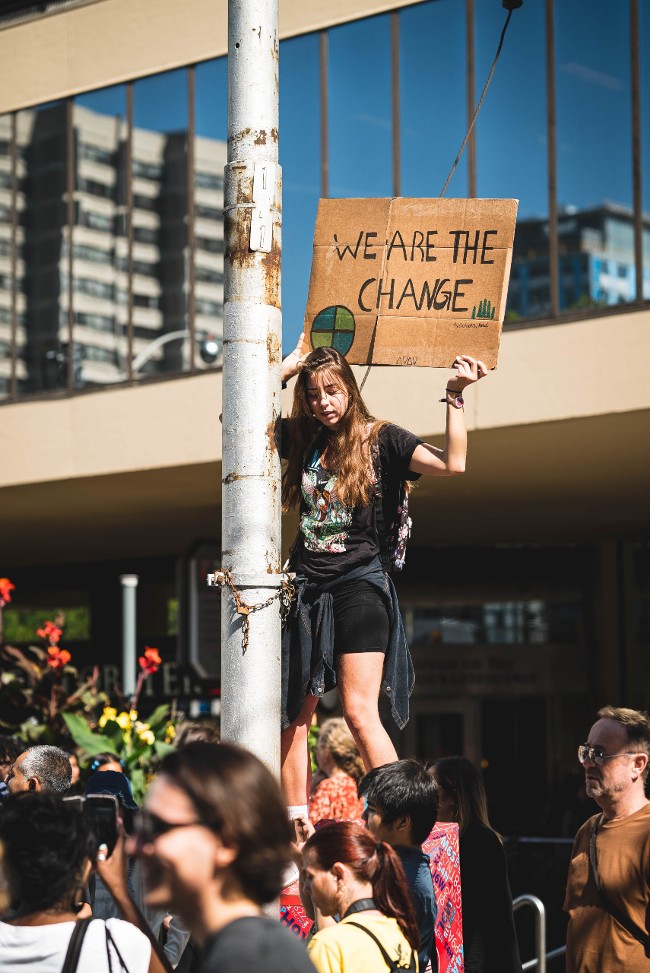Climate Change education: A “world-leading strategy” would benefit from being research-informed

On April 21st, the DfE published its education strategy for England on sustainability and climate change. This envisions that, by 2030, “the United Kingdom is the world-leading education sector in sustainability and climate change” – but how does the current content of the strategy match up to local and global opinions of what’s needed?
In this Policy Report, we compare the content of UK government plans with views expressed by teachers in England and with expert international opinion. Our research involved surveying secondary and primary teachers (N = 626) whose academy schools were attending mandatory staff development events unrelated to climate change. This approach generated a 95% response rate, allowing us to present our findings as a reasonable representation of the views of teachers in England on climate change education.
Overall, the teachers in our survey favoured a multidisciplinary action-oriented curriculum that starts in primary school. They wanted this to begin with student participation in mitigation projects such as conservation and family advocacy, leading to social and civic action such as local campaigning around the primary/secondary transition. These findings are aligned with the established UNESCO guidelines for climate education.
However, based on our analysis of the recent DfE strategy document, current proposals for climate change education in England fall short of teachers’ expectations and international guidelines. More generally, proposals for curriculum and implementation would benefit from greater cognisance of UK and international research findings regarding current expectations, challenges and progress in climate education.
Preliminary indicators for global standards of quality in climate change education are due to be unveiled at COP 27 (November 2023), paving the way for globally recognised comparisons of progress made by different nations. We believe it is timely, therefore, to highlight the importance of incorporating research in the UK’s efforts to be “the world-leading” education sector in this area.
Policy recommendations
• Sustainability and climate change education policy should be research-informed and action-oriented, encouraging and supporting research-informed practice in schools.
• Key aspects of climate change education related to social and individual transformation action should be incorporated into the national curriculum
Research-informed professional development is needed that enables teachers to:
• foster an interdisciplinary understanding climate change
• ensure a focus on values, attitudes, global inequality and social justice
• support students in comprehending and responding emotionally to possible future scenarios, to understand their own active role in shaping this future, and to gain a sense of hopefulness and self-efficacy
• Ambitions for climate change education in England should align with United Nations guidance and international indicators emerging from the MECCE Project.
Key findings
Teachers in England suggest climate change education should be action-oriented and include participation in social and civic change
In our survey, 98.7% of teachers in England considered that participation in local community advocacy (e.g. speaking and writing publicly about climate-related issues) should be included in a climate change education curriculum, with most (52.1%) considering this should begin in primary school. The great majority (93.4%) also favoured inclusion of participation in local campaigning (extending to legal demonstration) at secondary school. Such an action-oriented approach would be aligned with UNESCO’s globally recognised Action for Climate Empowerment (ACE) guidelines that state “The over-arching goal of ACE is to empower all members of society to engage in climate action…….”.
Current UK strategy does not mention any types of action beyond conservation. Instead, the new UK strategy begins with the statement that children are worried about climate change and want to know more about
• the impact it is having now
• how it will impact their future lives
This appears to promote children’s anxiety as the problem and providing knowledge as the answer, rather than preparing students as agents of change, able to act collectively to address climate change.

Climate in the Curriculum – towards global standards
The National Curriculum in England first makes a direct reference to climate change in Science and Geography at Key Stage 3 (ages 11-14 years), but does not consider the broader impacts of climate change on the environment, economy and society, or issues of social justice. In contrast, the curriculum in Singapore requires children to be introduced to global warming when at primary school.1 In Costa Rica, the National Curriculum emphasises social transformation and the need to empower “each student, in each age group and in all educational environments, for the transformation of themselves and the society where they live; strengthening the transition towards green economies and societies with sustainable lifestyles…”. The MECCE Project is publishing profiles of countries revealing progress on climate change education, to allow more detailed comparison across countries.
Children in England are not currently required to understand issues of global inequality and injustice associated with climate change – but their teachers want this in the curriculum
In Science, the National Curriculum in England requires students to learn about the potential effects and mitigation of human-generated greenhouse gases on the Earth’s climate. In Geography, students learn about “the change in climate from the Ice Age to the present” and “how human and physical processes interact to influence, and change landscapes, environments and the climate; and how human activity relies on effective functioning of natural systems” (P.243). However, the National Curriculum in England does not currently require children to understand the broader impacts of climate change on the environment, economy and society, or to consider issues of social justice in relation to climate change. In our survey of teachers, 99.7% considered that understanding issues of global social justice with respect to climate change should be included in a curriculum on climate change education. The DfE strategy does not refer to values (except in respect to impartiality), attitudes, inequality or justice, but claims to be informed by UNESCO’s roadmap which aims to “develop the knowledge, skills, values and attitudes that enable us all to make informed decisions and take individual and collective action on local, national and global urgencies”.
Most teachers in England, whatever their subject area, are already talking about climate change to their students – and want to see a cross-curricular approach
Most teachers (51%) in our sample favoured a cross-curricular approach to climate change education that involves at least six subjects delivering it. UK teacher educators have argued that climate change must be addressed in the curriculum by interdisciplinary frameworks of understanding that includes its ethical dimensions.2 However, current strategy for England states that children and young people build on an understanding of the world and the natural environment gained in the early years “through science, geography and citizenship programmes within the national curriculum”.
Teachers need professional development that is informed by current understanding
In our survey, teachers rated climate change education as most deserving of additional financial support in schools after literacy, and their readiness to teach it was related to how well it was resourced in their school. Teaching about climate change involves unique challenges that justify additional support. Research has identified numerous factors that predict its effectiveness3, emphasising the need for interdisciplinary, creative and affect-driven approaches4 that foster both concern and hope5, and help students manage their emotions positively6. Such research will be critical for informing policy and the education and continuing professional development of our teachers. The DfE intend to support the sharing of best practice but what is unclear is how “best practice” will be identified and whether/how it will be informed by research.
Global Benchmarks for Climate Change will soon be with us – how will we fare?
Since 2021, work has been underway to develop global indicators of progress with climate change education as part of the Monitoring and Evaluating Climate Communication and Education (MECCE) Project, with preliminary indicators due to be released at COP 27. MECCE is an international partnership project focused on increasing context-informed understandings of quality climate communication and education in policy and practice, as well as providing global data to support country benchmarking, target setting, and progress in its provision. MECCE comprises a partnership of over 100 scholars and organizations (including the University of Bristol) and an Advisory Committee comprised of the IPCC, UNESCO, UNFCCC, and UNESCO Global Education Monitoring Report. Importantly, the MECCE Project conceptualizes education about climate change as going beyond increasing scientific literacy. It should also engage psychosocial and action dimensions necessary for catalyzing change across each of three spheres of transformation: Political systems and structures, practical technical responses and personal values and beliefs.
UK transformation may only be possible through promoting and applying UK research in this area, although we might start by learning from initiatives evaluated by researchers elsewhere. Data regarding effective practice in other nations includes US children (aged 10-12 years) developing and implementing “family action plans” to engage in—and promote— active climate change mitigation at the household level, and writing and delivering public speeches to local policy-makers and community members in a city council meeting7,8. In Crete, primary and secondary school children interviewed parents about energy usage, with both pupils and parents becoming inspired towards more careful energy usage9. A similar approach was shown to benefit parental attitudes towards climate change in North Carolina10.
In summary, we look forward to England building on the newly published strategy on sustainability and climate change education with research-informed, teacher-led policymaking that aligns with United Nations guidance. In this way, we believe the United Kingdom will be better placed to achieve a “world-leading education sector in sustainability and climate change” by 2030.
Policy Report 74: Oct 2022
Further information
The Climate Change Education Research Network (CCERN) is funded by the GW4 alliance and brings together researchers active in this area within the South-West of the UK and beyond, also offering occasional free online events for teachers and policy makers.
The Monitoring and Evaluating Climate Communication and Education (MECCE) Project is an international research partnership of over 100 leading scholars and agencies. MECCE are developing new indicators and datasets to enable national and intergovernmental benchmarking and target setting, to spur increased quality and provision of climate change education.
UNESCO. Education for Sustainable Development: A roadmap. (Paris, 2020).
More information about the research paper
Teachers want to encourage children to take a public stand against climate change.
Authors
Professor Paul Howard-Jones (University of Bristol), Professor Justin Dillon, (University College London)
References
1. Chang, C. H. & Pascua, L. The curriculum of climate change education: A case for Singapore. Journal of Environmental Education 48, 172-181, doi:10.1080/00958964.2017.1289883 (2017).
2. Hawkey, K., J. James, and C. Tidmarsh. “Using Wicked Problems to Foster Interdisciplinary Practice among UK Trainee Teachers.” Journal of Education for Teaching 45 (4): 446–460. doi:https://doi.org/10.1080/02607476.2019.1639263 (2019).
3. Monroe, M. C., Plate, R. R., Oxarart, A., Bowers, A. & Chaves, W. A. Identifying effective climate change education strategies: a systematic review of the research. Environmental Education Research 25, 791-812, doi:10.1080/13504622.2017.1360842 (2019).
4. Rousell, D. & Cutter-Mackenzie-Knowles, A. A systematic review of climate change education: giving children and young people a ‘voice’ and a ‘hand’ in redressing climate change. Child. Geogr. 18, 191-208, doi:10.1080/14733285.2019.1614532 (2020).
5. Stevenson, K. T., Peterson, M. N. & Bondell, H. D. Developing a model of climate change behavior among adolescents. Clim. Change 151, 589-603, doi:10.1007/s10584-018-2313-0 (2018).
6. Ojala, M. & Bengtsson, H. Young People’s Coping Strategies Concerning Climate Change: Relations to Perceived Communication With Parents and Friends and Proenvironmental Behavior. Environment and Behavior 51, 907-935, doi:10.1177/0013916518763894 (2019).
7. Trott, C. D. Children’s constructive climate change engagement: Empowering awareness, agency, and action. Environmental Education Research, 23, doi:10.1080/13504622.2019.1675594 (2019).
8. Trott, C. D. Reshaping our world: Collaborating with children for community-based climate change action. Action Research 17, 42-62, doi:10.1177/1476750319829209 (2019).
9. Zografakis, N., Menegaki, A. N. & Tsagarakis, K. P. Effective education for energy efficiency. Energy Policy 36, 3226-3232, doi:https://doi.org/10.1016/j.enpol.2008.04.021 (2008).
10. Lawson, D. F. et al. Children can foster climate change concern among their parents. Nature Climate Change 9, 458-462, doi:10.1038/s41558-019-0463-3 (2019).
Contact the researchers


